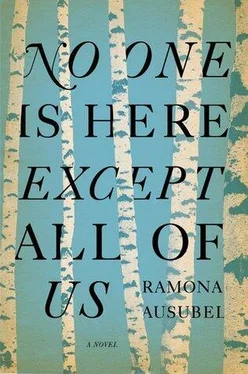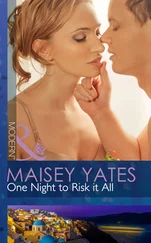I dropped my head. As simply as that, everything was unmade — a single crack and the silent darkness was flooded with fierce light. One sun shuts all the stars up. A bubble rose in my throat and I thought I might be sick. The stranger pulled the blankets over her body. The jeweler put his shirt on. I straightened silently up. “We tried to save you,” I said to the stranger. “All you had to do was let us.”
“You did save me. Look at me — I am saved.”
I was thinking of my children and their lives ahead, and I was thinking of the terrors surrounding us, and I was thinking of my own two pale hands. Now that the story had been snipped, those hands were all I had left to protect my family with. I would fail, I would watch them die, they would suffer and all I would be able to do was reach out toward them with my blind fingers. I had been there at the beginning of the world, and now I knew what it felt like to be there when it crumbled. I took the radio outside. The last sound it made was of bursting open on a rock when I threw it.
The stranger, naked under the blanket on the floor of the temple-barn, her home, did not record, but prayed. “Bless Lena and Igor and Solomon and the beautiful, nameless baby. Bless the people upstream and the people downstream. Bless the clothed and the naked. The night is ahead as the day is ahead. We pray the bodies that know each other keep on knowing each other. We pray that the bread rises. We pray that we keep believing.”
I stood at the doorway looking in, too angry to speak to God. Too angry with myself for believing in the protection of a new world. Too angry with the others for trusting the story. I touched what was within my reach, looking for something real. The wooden barn door, a rusted nailhead, my cheeks, my teeth, the spring my eyes tried to feed me with. It was as if the whole earth had gone soft under me.
Without being summoned, others came. They saw the radio. Without hearing it, they knew what it had said. I could hear a few old women inside join our stranger in her prayer. Then a few younger women started. Then the boys. They talked over the stranger. It was two, then three, then four, then all. Everyone had a prayer. If I could have found the steadiness to speak, I would have asked, begged, that the future — the only land my sons had to live on — would be longer than the past. That we had not found the ending to what had only just begun. We pray that the night is longer than the day. We pray that the saddles survive until horses walk under them. We pray that the horses have someplace to carry us. We pray that there are a few cookies left someplace. We pray that sleep will rinse us all out. We pray that our stomachs make themselves full. We pray that there is a reason for everything. We pray that we do not die, do not ever die and leave only scraps of our clothing — silent, torn flags.
These prayers were not one and then the next, these prayers climbed on one another, ground their heels into the shoulders of the others. The sayers of them started to shout, to yell their prayers in order to be heard. They put their necks back and screamed their hopes to the built sky. We pray, we pray, we pray . The sound of the prayers came smacking back from the walls. The walls yelled to everyone at once, and they voiced again their demands and wishes. It felt like being tumbled by a sudden torrent of water, a flash flood. I gasped, coughed. The prayers did not let up.
The people fell to their knees in the din of noise. They covered their ears and prayed louder, their own voices rattling in the cavities of their noses. They pounded their fists on the hollow drum of the barn floor. They stomped their feet. They jumped to get higher than the rest. And from above them, from the Constellation of Hope, Lost and Gained, one piece of one star was loosed and fell down to the floor, breaking into dust. When it hit, every single person stopped praying. They uncovered their ears and covered their mouths instead. The people looked at the broken piece of sky.
Now even hope wanted to bring the walls down around us.
“We will crush each other,” the stranger said. “We will crumble this place.”
“There will be no point in speaking if we don’t pray,” others argued.
“We will have no world left,” she told us.
“What if we already have no world left?” I asked from the doorway. The stranger made a sweep of her hand, pointing out the evidence, the facts, the furnishings that said our place was something solid.
“You pulled me from the river and we told a story. We just keep doing that.”
Everyone squinched their eyelids and clenched their fists and asked and asked and asked as hard as they could in their own rusted brains, and the room sagged with silence. In my mind there was no clear prayer — just the words please and help , asked of no one in particular because there was no one I trusted would hear me. The villagers filed out into a lawless place, a penetrable place, a breakable place.
I sat down by the rock where the radio had burst open. I held my head.
The stranger came and sat on the ground next to me. “I’m sorry,” she said. “I’m really sorry to have hurt you like this.”
“Did you really believe in the new world? At first?”
“No. I knew I could learn to. I wanted to.” She paused. “I have been working very hard to protect it by keeping everything out.” She told me about the mail, the odd bits she threw back into the river. She was trying to calm me, to say that the only threat was our own disbelief. I was not reassured.
“It’s all a lie then,” I said. “And we are idiots.”
“No,” she pleaded. “It’s just a day, another day, after hundreds of others before. Nothing has changed.”
“I don’t know what to do.” My boys appeared in my mind, ungrown, their faces sticky, questions on their lips. I was sure I would not have the answer they needed.
“Just as we have been doing. Waking, sleeping, loving, praying.”
“Except the story doesn’t make any sense. What happens without the story?”
She was quiet. The metallic scent of love was on her skin. “There is always a story. No matter what we do, it can’t help but unfold.”
“I’m afraid,” I said.
“Yes,” she told me.
We watched sparrows flutter up, leaves quaking when the birds lit again on the branches. Even those small bodies were enough to set the trees shivering.
That night, the ghosts dragged the old world into our dreams. They whirred like huge fans, blowing all our good work around until it hardly made sense anymore. The butcher dreamed of giant metal birds. The baker dreamed of black huffing trains that rolled through the valleys, full of grain and passengers. The banker’s wife dreamed of speaking to her sister through wires stretched across the mountains. All of us dreamed of villages bursting into flame, of running, the sound of boots hitting the earth behind us.
“Are you doing okay?” I asked the ghosts, who had once been people — grandparents and uncles — I knew and loved.
“We’re dead, if that’s what you mean,” they answered. We asked questions we had always wondered about — the chicken farmer wanted to know which child was his mother’s favorite, and the butcher asked his grandmother what it felt like to die and the butcher’s wife asked her sister what year it had been that the trees were so full of apples their limbs broke. The ghosts shrugged us off.
“We thought you were starting over,” they said. “We thought you were done with that old boring world we made.”
We tried to explain. “Your world was starting to erode.”
“Sure,” they said. “We understand. We don’t mind that we did it all for nothing.”
Читать дальше












